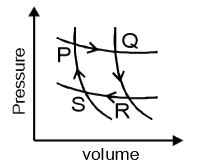STATEMENT-1: It is necessary to define two molar heat capacitor for a gas.
STATEMENT-2: Work is done by a gas when its volume changes.
Statement-1 is True, Statement-2 is True, Statement-2 is a correct explanation, for Statement-1.
Statement-1 is True, Statement-2 is True, Statement-2 is not a correct explanation for Statement-1.
Statement-1 is True, Statement-2 is False.
Statement-1 is a False, Statement-2 is True.
The correct Answer is:A
Topper's Solved these Questions
Similar Questions
Knowledge Check
- Question 1 - Select One
STATEMENT-1: The specific heat capacity of a gas at constant pressure is always greter than its specific heat capacity at constant volume.
STATEMENT-2: Work is done by a gas when it expands.AStatement-1 is True, Statement-2 is True, Statement-2 is a correct explanation, for Statement-1.BStatement-1 is True, Statement-2 is True, Statement-2 is not a correct explanation for Statement-1.CStatement-1 is True, Statement-2 is False.DStatement-1 is a False, Statement-2 is True. - Question 2 - Select One
One mole of an ideal gas undergoes a process whose molar heat capacity is 4R and in which work done by gas for small change in temperature is given by the relation dW=2RdT, then find the degree of freedom of gas
A3B4C5D6 - Question 3 - Select One
Cp is always greater than Cv for a gas, which of the following statements provide, partly or wholly, the reason for this?
(i) No work is done by a gas at constant volume
(ii) When a gas absorbs heat at constant pressure, its volume must change
(iii) For the same change in temperature, the internal energy of a gas changes by a smaller amount at constant volume that at constant pressure
(iv) The internal energy of an ideal gas is a function only of its temperatureA(i),(ii)B(ii),(iii)C(iii),(iv)Dall
One mole of an ideal gas undergoes a process whose molar heat capacity is 4R and in which work done by gas for small change in temperature is given by the relation dW=2RdT, then find the degree of freedom of gas
View SolutionCp is always greater than Cv for a gas, which of the following statements provide, partly or wholly, the reason for this?
(i) No work is done by a gas at constant volume
(ii) When a gas absorbs heat at constant pressure, its volume must change
(iii) For the same change in temperature, the internal energy of a gas changes by a smaller amount at constant volume that at constant pressure
(iv) The internal energy of an ideal gas is a function only of its temperatureView SolutionStatement-1: For a gaseous system Cp is always greater than Cv
Statement-2: Work done by a gas at constant volume is zero.View SolutionA fixed mass of gas undergoes the cycle of changes represented by PQRSP as shown in figure. In some of the changes, work is done on the gas and in others, work is done by the gas. In which pair of the changes work is done on the gas ?
 View Solution
View SolutionWhen an ideal gas undergoes an adiabatic change causing a temperature change ΔT
(i) there is no heat ganied or lost by the gas
(ii) the work done by the gas is equal to change in internal eenrgy
(iii) the change in internal energy per mole of the gas is CVΔT, where CV is the molar heat capacity at constant volume.View Solution

